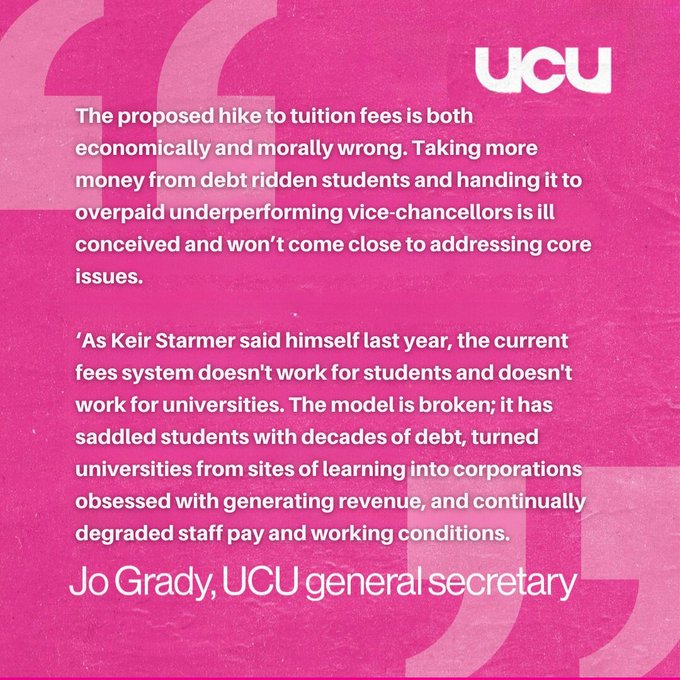Labour’s Tuition Fee Debacle
“Labour must stand by its commitment to end the national scandal of spiralling student debt and abolish tuition fees. We lost the election, but we did not lose our values or determination to tackle the injustice facing young people going to university.” – Keir Starmer, 2020
“The Labour Party is a moral crusade or it is nothing.” – Harold Wilson.
Labour is raising tuition fees in England for the first time in eight years. The rate at which Starmer has ditched and u-turned on policies that were once held as sacrosanct is astonishing, but now completely normalised.
In 2020 Starmer was in a battle against his three rivals, Rebecca Long-Bailey, Lisa Nandy and Emily Thornberry, and keen to hold on to some left-wing credentials. In February 2020 he wrote:
“Under the Tories, tuition fees have tripled and young people are leaving university with nearly £60,000 worth of debt. Let’s be blunt: we need to end the scandal of spiralling student debt.”
“Young people cannot wait another four years for a Labour government to tackle this issue. That is why I would urge the chancellor to use next month’s budget to invest in the next generation by restoring maintenance grants for students in further and higher education.”
Today, that pledge has been abandoned and overturned.
Innes McGarry, Scottish labour’s press adviser claims that: “Education is devolved. Scottish Labour supports free tuition and will continue to do so.” He suggests that there are no plans for Labour to change the policy of free tuition in Scotland. But this leaves a conundrum, why would the party believe in one thing south of the border and another north of the border?
McGarry’s claims seem tenuous at best.
There are strong indications that Scottish Labour want to have a “grown-up conversation” about higher education. There are definitely more “tough decisions” ahead.

It is not that the current position is unproblematic. Having no tuition fees is great, but universities are suffering continuous cuts in teaching budgets. But the solution is not to impose tuition fees and exclude people from higher education.
The solution is to stop treating universities as cash-cows whose purpose is to generate vast amount of money. There should be a limit on lucrative foreign students and a commitment to universities as places of learning not centres for profit. As UCU general secretary Jo Grady said:
“The proposed hike to tuition fees is both economically and morally wrong. Taking more money from debt ridden students and handing it to overpaid underperforming vice-chancellors is ill-conceived and won’t come close to addressing the sector’s core issues.”
“As Keir Starmer himself said last year, the current fees system doesn’t work for students and doesn’t work for universities. The model is broken; it has saddled students with decades of debt, turned universities from sites of learning into corporations obsessed with generating revenue, and continually degraded staff pay and working conditions.”
“Labour accepts the issues facing higher education are systemic yet has only applied a sticking plaster. Its principles are vague and could be exploited by vice-chancellors, while higher fees mean even more graduates will fail to pay back their loans, ultimately costing the exchequer. The Chancellor says ‘invest, invest, invest’: it is time to do that in higher education, especially if Labour is serious about delivering a decade of national renewal.”

There is a wider question to be had – a far deeper question – about the purpose of higher education in times of social and climate crisis. Every part of common sense tells us that centres of learning should be re-purposed for the challenges we face as a society and as a species. Completing the project of turning universities into vast centres for channelling huge profits to be gathered by unaccountable estates with no real purpose would seem to be the very last thing we should be doing.

Interesting that many of those who have an opinion on this benefitted from free university places and better support while there. I believe that Anas Sarwar has suggested that ‘we are not a society that gives things for free’. I despair at the way that Labour has commenced and believe that if they were to be in power in Scotland it would be detrimental to many who currently benefit from SNP policies. There is much to criticise the SNP over, but they did support free university places and free prescriptions etc.
Bill
Yes Bill, I think its called ‘pulling up the ladder’
Scottish universities should have been supported to provide student accommodation and benefited from the income while probably being able to reduce the cost to students rather than private companies profiteering. Our universities created the demand for student accommodation and should gain from that.
It is a sticking plaster and I really hope for a deeper solution.
But actually, a sticking plaster right now is absolutely needed as the sector is going bankrupt, in England, anyway.
The Scottish model is also deeply flawed and relies on English students paying fees to survive.
Agreed. The whole thing is whacked.
From what I have read Brexit has led to a significant fall in income from EU funded research at Scottish universities.
Spot on – the fundamental flaw is to treat universities as if they were businesses. They are no such thing, just as schools and hospitals are not. In addition to student fees being covered by the state, as they are for Scottish students in Scotland, universities should receive core funding in recognition of the central role they play in society.
I guess that Small didn’t notice that Scottish Labour (and the Lib Dems) abolished university tuition fees in Scotland 23 years ago.
I take issue with the trope that the future payment of fees (or not) stops anyone from going to university. That doesn’t seem to be the case at all, but it may discourage students from flaking-out after a year (and you are going to leave university with significant debts anyway, and repayment of them isn’t means-tested whether you have a degree from St Andrews or a dubious bit of paper from the U. of West of Scotland).
If you need to pay for free university courses, turning universities into fee & accommodation cash-cows is a no-brainer. Furthermore, Scotland is a prime example of somewhere that has bumped-up it’s graduate stats by letting places that used to teach hair-dressing and car mechanics dish out degrees.
“That doesn’t seem to be the case at all”. Can you provide evidence for this statement?
I was at University in the ’60s. My family didn’t pay tuition fees and I got a maintenance grant. I was happy that the country seemed to me to be becoming more equal, with comprehensive education replacing selective schooling, a thriving economy and less obscene wealth in evidence.
Alas, things started to go wrong in the ’70s and got worse with Thatcherism in the ’80s. I’m ashamed that some of my generation, having benefitted from Government or Local Authority support, have pulled up the ladder on those who were coming after. I’m glad we still, in Scotland, offer free Higher Education tuition, although I would wish for maintenance grants to be available as well.
Finally, I profoundly disagree with the arbitrary ranking of institutions/qualifications and especially the showing of respect for some while showing disdain for others. My experience has shown me time and time again that it is most unwise to make judgments on this basis.
I can’t be bothered to look it up so I will cocoon myself in my beliefs, is a dangerous and lazy attitude and the cause of many wars.
If that’s true (reference please) it’s all the more reason for them to be ashamed of their current stance isn’t it?